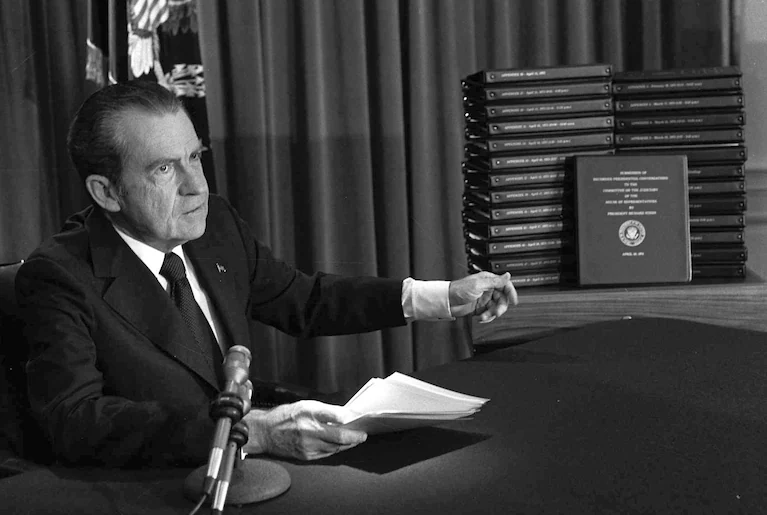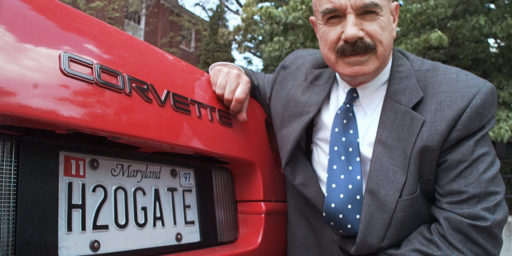Watergate at 50
Half a century have passed since a botched burglary changed history.

Friday will mark the 50th anniversary of the break-in at the Democratic National Committee offices at the Watergate hotel that would ultimately lead to President Richard Nixon being forced to resign in disgrace. That it coincides with hearings on a successor whose crimes make Watergate pale in comparison is remarkable.
The Washington Post, the newspaper that contributed the most to uncovering the scandal, has been running numerous retrospectives. I want in particular to call your attention to chief correspondent Dan Balz‘s essay “Watergate happened 50 years ago. Its legacies are still with us.”
Watergate, along with the Vietnam War, marked a dividing line between old and new, ushering in a changed landscape for politics and public life — from a period in which Americans trusted their government to a period in which that trust was broken and never truly restored. “It’s a hugely important historic moment,” said Julian Zelizer, a historian and professor at Princeton University. “And we entered a new era when it was over.”
Though not a straight line by any means, the links between former president Richard M. Nixon and former president Donald Trump also are clearly identifiable, from their ruthlessness to the win-at-any-cost calculus of their politics. That their presidencies played out differently — Nixon resigned amid impeachment proceedings; Trump served his entire term and may seek another despite twice being impeached, although not convicted — is testament toa more deeply polarized electorate, the erosion in the strength of democratic institutions and the transformation and radicalization of the Republican Party.
The aftermath of the Watergate scandal opened up the operations of Congress but also contributed to making the legislative body less manageable. The scandal helped change the way reporters and government officials interacted with one another. A more adversarial relationship has existed ever since. The era spawned reforms that worked and some that did not, from campaign finance to intelligence.
Politically, both major parties were affected. A seemingly broken Republican Party reconstituted itself with a more anti-government ideology. Democrats, led by the big class of 1974, slowly began a transformation away from the lunch-pail coalition of White working-class voters and toward a more diverse coalition that now includes highly educated coastal elites.
I think that’s mostly right, although I’m not sure the evolution of the two parties had much to do with Watergate. Indeed, had the break-in not occurred or its connection to the campaign gone undiscovered, Nixon would have easily been re-elected in 1972 and served out his term. Ronald Reagan, not Gerald Ford, would likely have been the nominee in 1976. And, without the need for a moral cleansing, who knows whether Jimmy Carter would have emerged as the Democratic nominee.
Still, I agree with this:
[S]ubsequent investigations; the indictments and convictions of Nixon administration officials; the impeachment articles passed in the House Judiciary Committee; and Nixon’s resignation combined into an event that shattered the confidence and idealism of previous decades.
But am skeptical of this:
Garrett M. Graff, author of the book “Watergate: A New History,” describes Watergate as a dividing line in history — the event that moved Washington from a sleepy capital dominated by segregationists, veterans of World War I and print newspaper deadlines to a capital ruled by a new breed of politicians, a more adversarial media now in the digital age and a country deeply skeptical of government and politicians.
This strikes me as classic post hoc ergo proper hoc. WWI ended in 1918, 56 years before Nixon’s resignation. A person who was 25 when the war ended would have been 81. To the extent they were still running Congress, they were decidedly on borrowed time.* And the “digital age” was two decades away.
“The Vietnam War, the Pentagon Papers and Watergate … fundamentally rewrote the relationship between the American people and their government,” Graff said, “and caused a collapse in the public’s faith in those institutions that our nation’s leaders are still struggling with today.”
As William Galston of the Brookings Institution put it, “We have been living for nearly half a century in the world that Watergate made.”
Again, I think that’s right. The American people have never recovered their naive faith in the goodness of their leaders—or in the press.
The shattering of trust in government
The Pew Research Center has a graphic on its website that charts the decline of trust between citizens and government. It is a vivid illustration of the world that Watergate helped to make.
The graphic begins in 1958, near the end of the presidency of Dwight D. Eisenhower, when 73 percent of Americans — majorities of both Democrats and Republicans — said they trusted the government to do what is right “just about always” or “most of the time.” In the fall of 1964, despite the assassination of President John F. Kennedy a year earlier, which some people see as the moment when the idealism of the period was broken, trust peaks at 77 percent.
By 1968 and the end of the presidency of Lyndon B. Johnson, with Americans violently divided over Vietnam and shaken by the assassinations of Martin Luther King Jr. and Robert F. Kennedy, the line on the chart heads downward, but still with a majority expressing trust. From there, it begins to fall farther. By late 1974, after Nixon left office, just 36 percent of Americans say they trust their government.
“The trust has never really rebounded to the pre-Watergate levels,” said Joycelyn Kiley, Pew’s associate director of research.
The decline in trust affected virtually every institution over time. “One way of thinking about it is that Americans ceased to trust the men in suits — whether those men in suits were lawyers, university professors, the press and especially, especially, the government,”said Bruce Schulman, a professor of history at Boston University.
Kiley said more than just the Watergate scandalhas caused all this. But her point about the lack of a rebound was underscored by Pew’s latest measurement, released last week, which found that today, just 20 percent of Americans say they trust their government to do the right thing all or most of the time. At the same time, Americans see a continued role for government and say that government is not doing enough for several groups of people.
One irony of the decline at the time of Watergate is that democracy had worked, from the actions of government institutions to the public’s response. “It’s really important to understand that the process that took down Nixon was driven by an extraordinary level of civic engagement,” said Rick Perlstein, a historian who has written multiple volumes about the history of the 1960s and 1970s. “The response was not this kind of nihilistic response we would see now.”
But while the institutions worked, the revelations about the vastness of the Watergate conspiracy painted an ugly portrait of the use and abuse of power during Nixon’s presidency. “The courts, the Senate, the Congress, the House Judiciary Committee, the press. Everything worked the way it’s supposed to. But people ended up with a very bad taste in their mouth,” said Jim Blanchard, who was elected to the House in 1974 as a Democrat from Michigan and later served as governor.
Coupled with the governmental lying about Vietnam, exposed most vividly with the publication of the Pentagon Papers first by the New York Times and later by The Washington Post, government was under attack from both the left and the right, though for different reasons.
“It’s amazing how fast we shifted from the post-World War II trust mode, which lasted for about 20 years, into the post-Vietnam, post-Watergate mistrust mode,” Galston said. “Once we lost that trust, we never regained it.”
Multiple scandals of that magnitude in such a short period will naturally erode trust. That they implicated presidents of both parties added to it. Coupled with an elite press that now saw Woodward and Bernstein as their lodestar, literally looking to uncover the next Watergate scandal (even minor ones have gotten a -gate suffix) and we have a perpetuating cycle.
The ‘Watergate babies’ come to Washington
Three months after Nixon resigned and two months after he was pardoned by President Gerald Ford, the 1974 midterm elections dealt a seemingly devastating blow to the Republican Party. The election produced a huge new class of lawmakers, more than 90 in all, including 76 Democrats in the House who became known as the Watergate babies.
These Democrats were diverse in their ideologies — some moderates and conservatives but many liberals. They shared a passion for reform. “The collective sense was that it was time to change the seniority system,” said Tom Downey, who was elected to the House as a Democrat from New York at age 25. “We wanted this to be a more accountable institution.”
Leon Panetta, who had come to Capitol Hill in 1966 as a staffer and was elected as a Democrat to the House in 1976 representing California, said, “You really had a sense that you had been empowered by the American people to straighten out Washington and to implement reforms and to really do things different in a way that would hopefully restore trust.”
“There were so many new members that the old guys couldn’t come and encircle them and try to convince them that they should be quiet for the first 10 years and stay out the way,” said former congresswoman Pat Schroeder, a Democrat from Colorado who was elected in 1972.
The new class helped oust three powerful committee chairmen, something unheard of at the time. Other reforms redistributed power in the House. “We had opportunities that no new members had historically — to speak, to negotiate, to assert our power,” said Phil Sharp, elected to the House as a Democrat from Indiana in 1974. He added, “It really meant we had more influence in the subcommittee, we had more influence on the House floor, we had more influence in the conference committees.”
The result was a more open and transparent House, but also a more cumbersome legislative body. Today, every member of Congress is an independent actor with access to the media and many to big money and, if motivated to do so, the ability to frustrate leadership. That is an offshoot of what started in the 1970s.
“I believe that over time, it reduced the ability to get to a decision, which I would argue is one of the compelling issues in government today,” Sharp said. “Ultimately, democracy must prove not that it’s open, it has to prove that … it can actually make a decision on something of significance.”
While I was aware that 1974 was a Democratic wave election and produced a lot of reform legislation, I really hadn’t given much thought to the impact it had on the power dynamics in Congress. We had something similar happen in 1994—a Republican wave election that put the GOP in charge of the House for the first time in decades. I’d argue that the second did more damage than the first in this regard but probably because of differing agendas. The Class of 1974 came in eager to pass bold new legislation whereas the Class of 1994 came in to roll back Big Government.
Still:
“For a legislator and particularly for a leader, your goal is to pass legislation,” said John A. Lawrence, author of the book, “The Class of ’74: Congress After Watergate and the Roots of Partisanship” and a former chief of staff to House Speaker Nancy Pelosi (D-Calif.). “And it becomes harder when you honor transparency over effectiveness.”
Then-House Speaker Thomas P. “Tip” O’Neill Jr. (D-Mass.), among others, had worried about too much openness, especially the decision that would allow C-SPAN to begin to televise House floor proceedings in 1979. “They understood that the more public the system was, the less power the old order would have,” said former speaker Newt Gingrich (R-Ga.).
Elected in 1978, Gingrich said he found the institution “astonishingly open” to newcomers on a mission, like himself. He used the levers available in a more open institution — from television in the House to new ethics rules — to chart a rise to power that in 1994 would drive Democrats from control in the House for the first time in 40 years.
The notion that democracy functions better when the citizenry can’t see it work is paradoxical, to say the least. But, while it may not be true in a parliamentary system, it makes sense in a system such as ours that puts so many obstacles in the way of governing. Getting things done requires compromise, which often means some less than savory horse-trading. That looks an awful lot like corruption when done in plain view. Add to that a permanent campaign and a media environment that thrives on controversy, nothing gets done. Compromise is weakness—if not treason.
The impact on the political parties
Watergate left the Republican Party decimated, or so it seemed.
“The conventional wisdom was, oh, the Republicans are done for a generation,” said Beverly Gage, a professor of history at Yale University. “That’s not what happened. But it is more true if you said it’s the Nixon wing of the Republican Party [that is dead]. Watergate was much more devastating to that part of the Republican Party.”
A Republican Party personified by politicians like Ford, Nelson Rockefeller and George Romney was taken over by a new, Southern and Sun Belt-based conservative movement that viewed government with considerably more hostility. In 1964, this brand of conservatism, led by Sen. Barry Goldwater of Arizona, went down in defeat to Johnson. By 1980, with the election of Ronald Reagan, the era of New Deal liberalism had been blunted by a conservatism that would hold sway in the party and the country for decades.
Again, I’m skeptical of this. Ford was the House Minority Leader, not a contender for the Presidency, at the time of the break-in. He became Vice President after the resignation of Spiro Agnew and then President when Nixon resigned. Regardless, Reagan almost beat him in 1976. It’s not obvious to me that Watergate was the reason he took over the party. Indeed, as Rick Perlstein and others have been arguing for a long time now, Nixon himself embraced the Southern Strategy in 1968 and 1972. The difference was that he was actually interested in passing programs whereas his successors weren’t.
Schulman, who wrote “The Seventies: The Great Shift in American Culture, Society and Politics,” said that, while it is an oversimplification to say that Reagan’s election was a response to Watergate, the reaction to the scandal nonetheless provided fertile ground for the conservative, anti-government ideology Reagan championed.
“You have to remember that for most of the post-World War II period, liberalism, for better and worse, had really been the reigning public philosophy in the United States,” Schulman said. “One of the ways that Watergate is very important is in the transformation of the Republican Party into a conservative party. … And after 1980, it was, by all effects, really a conservative party.”
Zelizer noted,”When Reagan in 1980 is lashing out against government, I just think there’s more support at some level for the kind of arguments he’s making, because people have a Richard M. Nixon, even though he is a Republican, they have a Richard M. Nixon in their mind.”
So, I agree that “Government is Bad” is an easier sell in the wake of Watergate. But, again, this was over-determined. Vietnam, the clash over civil rights, and all manner of other upheavals primed the pump.
This, too, is interesting:
Meanwhile, the Democrats were to undergo their own transformation, thanks in part to the infusion of new members of Congress beginning with the 1974 election. “They tended to be more educated, more professional than previous tranches of Democrats, less connected to the working class, more interested in issues that weren’t within the four corners of meat and potatoes,” Galston said.
As Perlstein said, “It’s not the beer-and-a-shot, lunch-pail Democratic Party anymore.”
No one more typified the new breed than [Gary] Hart, who was elected to the Senate after managing George McGovern’s 1972 presidential campaign that ended in a landslide loss to Nixon. “I was so angry at Watergate and the fact that it had not had the impact on the ’72 campaign that it should have had and eventually did have,” Hart said in explaining why he ran in 1974.
Hart helped lead the party in new directions, and his eventual challenge to — and near-victory over — former vice president Walter Mondale in the 1984 Democratic presidential nomination contest pitted the old Democratic Party, tied to powerful labor unions, against a newer Democratic Party more oriented to rising forces of technology and to issues such as the environment and globalization.
The debate over what kind of party the Democrats should be, which was aired out that year, continues to echo today, as the Democrats wrestle with the demands of a more vigorous liberal wing and the desire to win back some of the White working-class voters who defected to the Republicans starting in the Reagan years.
Again, though, the fact that this happened after Watergate doesn’t mean it happened because of Watergate. Certainly, the wave election of 1974 hastened it because of the sheer numbers. But a younger generation was always going to take over the party and bring with it new attitudes and ideas. And the gradual shift of Southern Democrats into Republicans meant a whole wing of the party was gone and no longer going to feed its leadership.
Watergate was a seismic event in American politics. But, while one can trace most changes back to that event through creative interpretation of history, it’s a mistake to attribute large changes to single causes.
________________________
*Indeed, these folks were so old that it occurs to me that “World War I” was a typo and he actually said “World War II.” But WWII had only been over 29 years at this point, so its veterans were in their political prime and would continue to dominate American politics for decades.






I was in grade school at the time, so not really aware much of what was going on. One of my friends asked our teacher if a dam had burst somewhere and drowned a lot of people (a watergate was obviously some kind of dam, right?) The teacher just looked at him and didn’t answer.
Maybe it was just the way my parents thought but they never did buy into the whole hail-to-the-chief-leader-of-the-free-world-super-human bumph of the elevated position of the president. Nixon proved he was flawed and not worthy of the office and should have been treated accordingly. They thought Ford was wrong to pardon Nixon, and they didn’t buy into the healing process argument. “We’re not the idiots they think we are.” My father told me years later when we discussed this. “Don’t let them get away with that c**p.” That’s been my guiding principle ever since. And in every -gate scandal since then, there’s been an argument that the damage to the country would be too much to risk going after wrong-doers with the full force of the law. An argument, that coincidentally I’m sure, only benefits the wrong-doers.
It may be just the haze of old memories, but I seem to remember that the horse trading was discussed fairly openly. I seem to remember some of my Reps or even Senators talking about how they didn’t like this or that part of some bill but they were able to get some other thing that made the deal worth it.
I think the difference now is that a significant number Republicans don’t want anything. They don’t get their support for being for things like roads or airports, but rather being against liberals or against “people who think they are better than you”
@MarkedMan:
It’s called “owning the libs.”
Kevin Drum looked at similar data last year. But he looked at it via a study looking at partisan differences. Dem trust in government has been steadier and on average higher than Rs, who swing more widely depending on whether it’s an R or D prez. Drum also sees in the timing a strong effect of FOX “News”. Serendipitously the subject of your next post. I graduated college in ’69. Anecdotally, I’d say Vietnam was far more a blow to trust than Watergate, although it took a long time for Vietnam to sink in.
You note “That they (multiple scandals) implicated presidents of both parties added to it.” OK, top of the head:
Ford – aside from the pardon itself I don’t recall anything.
Carter – some small financial stuff involving his Ag Secretary and his brother.
Reagan – multiple small scandals and Iran-Contra.
GW – lingering Iran-Contra and little else I recall.
Clinton – a consensual extra-marital blow job
W – multiple small scandals and the whole torture and other war crimes thing.
Obama – squeaky clean plus, peripherally, the whole made up EMAIL!Ghazi!Foundation! thing. Which the W & B press were eager to climb all over.
TFG – where to start, crowned by 1/6.
Like most bothsides, seems pretty asymmetric to me. Seems to fit the very old line that D scandals involve sex and money while R scandals are attempts to subvert the Constitution. But I strongly agree with you that while Woodward and Bernstein were heroes, the precedent that reporters could get rich and famous with adversarial reporting has been very harmful.
But if we want to look at downstream effect we have to look not only at Watergate, but at the pardon. DoJ was apparently ready to proceed against Nixon when Ford pardoned him for crimes known and unknown. Remember that it wasn’t just the one break-in and its coverup. Once people started looking, there was a long list of felony charges on the table. IIRC the OLC opinion that a sitting prez is above the law came out of Watergate. But then Ford established the precedent that ex-presidents are still immune. The results of that mistake are before us, four times during the day and twice in prime-time. Why should we have trust in a president who’s above the law? If we don’t prosecute TFG, the next GOP prez, DeSantis, Cotton, even Romney, will be a horror story.
@gVOR08: I was thinking more of Johnson and Nixon than subsequent Presidents.
Watergate wasn’t the dividing line, Vietnam was. A lot of things turned history in the late 60’s and early 70’s – the assassinations, the riots, women’s liberation, the nascent gay rights movement, the co-opting and commercialization of the counterculture, and Watergate, but mostly the war.
If I was to pick a single moment in time it would be February 27, 1968 when Walter Cronkite effectively announced that everything the LBJ, the DoD and the military had been telling us about Vietnam was a lie. Many more hits were to come – the Pentagon Papers – but the air really started to leak out the big American balloon when we got the news that we were not going to win in Vietnam.
By the time Watergate came along distrust of the government was already well-advanced. Watergate just accelerated an already metastasizing cynicism.
@James Joyner: LBJ has some dicey stuff in TX, but as prez all I recall was Bobby Baker. LBJ and Nixon would seem to fit my D sex and money v R subvert the Constitution model. Doesn’t seen very bothsides. What am I missing?
@Michael Reynolds:
I think Vietnam and the Pentagon papers had more influence, but I wonder how the draft influenced things as well.
It’s one thing to oppose a war being fought by volunteers, it’s quite another to oppose a war one might be forced to fight in. Or to oppose being forced to fight regardless of one’s views on the war.
@gVOR08: While the Pentagon Papers weren’t released/leaked until 1971 they mostly implicated LBJ.
@James Joyner: I’d see the Pentagon Papers as more under Vietnam than scandal, but I won’t belabor the point.
@gVOR08: I think that the Pentagon Papers, maybe, revealed the scandal that Vietnam was. My brother volunteered to go to Vietnam the day after he graduated from high school (in 1965). The only statement that he ever made to me about his service other than personal stories of people he served with (and not many of those, BTW) was “I’m not proud of anything we did in Vietnam.” (emphasis NOT added)
@Kathy:..it’s quite another to oppose a war one might be forced to fight in. Or to oppose being forced to fight regardless of one’s views on the war.
Never forget that draftees were forced at the age of 18 to fight and could not even vote the bastards out of office that were sending them to the jungle to get their heads blown off. The voting age was 21.
@gVOR08:
Mark Felt was the hero. Woodward and Bernstein were stenographers.